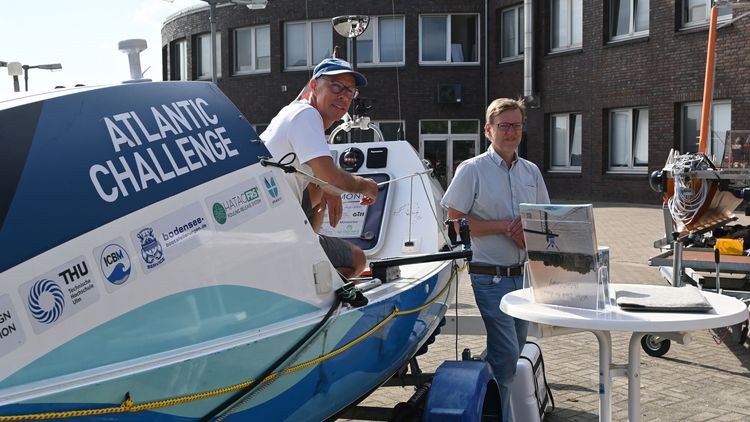Extreme rower Martin Stengele and Prof. Dr. Oliver Wurl and Leonie Jaeger from the Institute for Chemistry and Biology of the Marine Environment (ICBM) at the University of Oldenburg are forming an unusual alliance for marine research. Stengele will be the first German solo rower to cross the Atlantic alone in the “World's Toughest Row”. A camera and various measuring devices will be installed on board his six-meter-long ocean rowing boat “Mars” to collect data for science during the journey. “From the very beginning it was important to me that this challenge would not just be a physical and mental achievement. With this trip, I want to make my personal contribution to gaining more knowledge about the sensitive ocean habitat. So that the scientists from the ICBM can use the measurement data collected to provide the responsible institutions with a basis for their further action to protect the oceans. Even if this commitment makes my crossing anything but easier,” says sports therapist Stengele. ICBM researchers Wurl and Jaeger and Dr. Olaf Meynecke from the Griffith University in Australia were interested in this unusual offer.
Wurl and his team are investigating the surface layer of the seas - where the ocean and atmosphere meet. This layer is omnipresent and up to 1 millimeter thick. Under favorable conditions, it forms a slimy biofilm full of algae and microbes and is like the skin of the ocean. Everything that the ocean and atmosphere exchange - gases, heat, fresh water and particles - must pass this layer. In some places in the ocean, certain substances change the properties of the surface film so that the light is reflected differently there, making the surface films visible. These visible films are called slicks. “All physical, chemical and biological processes that take place at the boundary between air and water can be influenced by slicks,” says Leonie Jaeger, PhD student at the ICBM. “The distribution of slicks in the open ocean is currently largely unknown. We therefore hope to gain valuable data from Martin's voyage.” With a camera on board, Stengele will take a series of photos of the sea surface to document slicks and record their size, shape and distribution. Below the waterline, a probe will be attached to the rowing boat to continuously determine the water temperature and salinity. This data will later be used to analyze the photo series, for example to track changes in the water masses. The data from a wind sensor can later be used to investigate how different wind speeds affect the formation of slicks and up to what wind speed slicks occur.
“In addition to slicks, layers of water masses in the upper meters of the ocean also influence the heat exchange between the ocean and the atmosphere,” says Oliver Wurl, professor and head of the working group ‘Processes and Sensors of Marine Interfaces’. “However, such investigations are difficult because research vessels mix the uppermost water layers. Martin offers us a unique opportunity to record near-surface water stratification on a small scale. We will ask Martin to lower a probe twice a day to a depth of 10 meters to determine temperature and salinity.” The changes in temperature and salinity in turn determine the density of the water, i.e. the weight per volume, and thus the stratification of lighter over heavier water masses. The heat exchange has global significance, as the ocean reduces global warming by absorbing additional heat, but this has an impact on marine life.
Martin Stengele was a guest at the ICBM in Wilhelmshaven in August to familiarize himself with the devices and test them on the rowing boat. The Nassauhafen harbor is located behind the institute, from where he could set off directly for his training sessions at sea.
Stengele will begin his journey across the Atlantic in December on the Canary Islands. His destination port is in the Caribbean, heading west-southwest - around 4800 kilometers away. As a solo rower, Stengele expects the crossing to take at least 60 and up to 90 days.
Stengele will document all whale observations during his Atlantic crossing for Dr. Olaf Meynecke's “Whales and Climate” project. He will record the exact location of the sighting, as well as the number of whales, their behavior, direction of movement and other parameters. This information will be supplemented with sound recordings from an underwater microphone.

![[Translate to English:]](/f/5/_processed_/3/2/csm_ICBM-Logo-transparent-_91fe1c6774.png)



